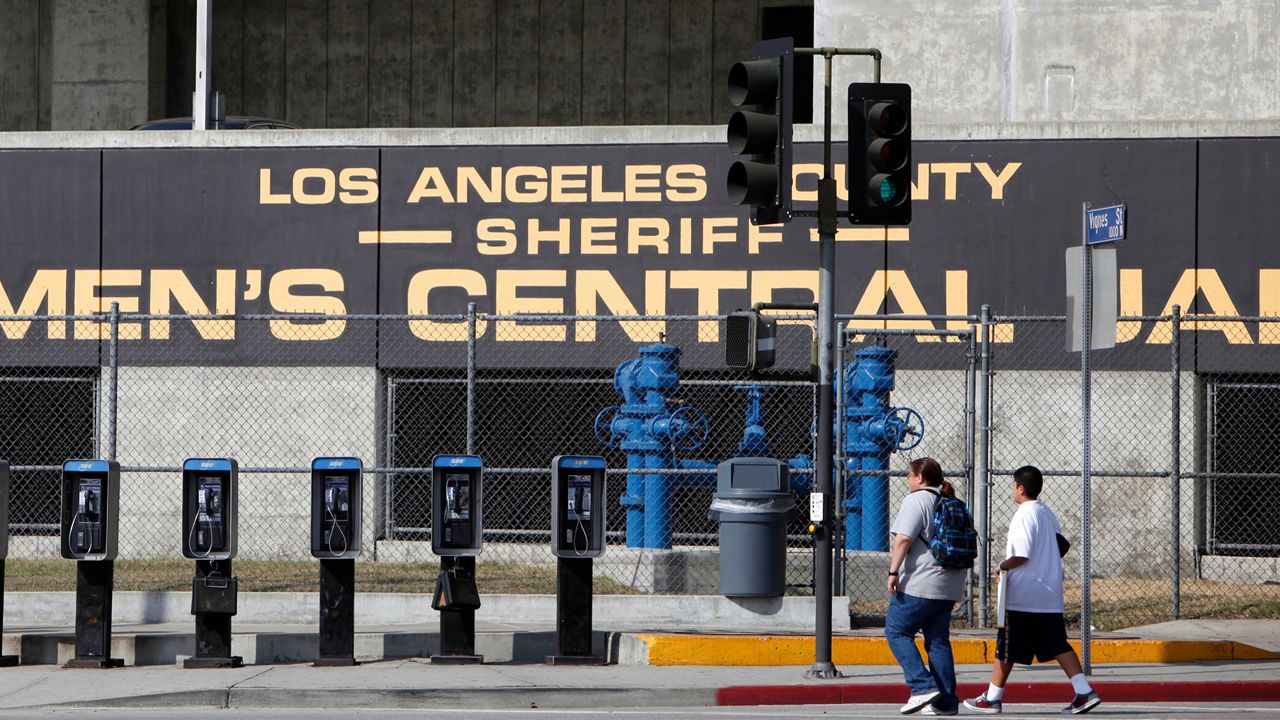LOS ANGELES (CNS) - With more than 5,500 inmates in quarantine or isolation in Los Angeles County jails, Assistant Sheriff Bruce Chase assured members of a watchdog panel Thursday that universal testing is underway, custody deputies are required to wear masks and inmates have been provided with masks, while advocates raised concerns about lapses in safety protocols.
The Civilian Oversight Commission had subpoenaed Sheriff Alex Villanueva to appear to discuss concerns about his handling of the COVID-19 crisis in the jails, but the sheriff defied that order and sent Chase in his stead.
A presentation by the Sybil Brand Commission, delivered by Cheryl Grills, who chairs that commission, raised a number of concerns based on investigations of the Century Regional Detention Center, North County Correctional Facility and Men's Central Jail.
Though conditions have improved dramatically since early March, especially at the Century Regional Detention Facility, Grills said issues remained, including deputies moving between quarantined and non-quarantined areas without taking precautions, some male inmates not wearing masks, and inmates who are left to set their own rules for cleaning their living spaces.
Triple bunks at NCCF prevent social distancing in the jails, while a dialysis dorm at the Men's Central Jail has insufficient protocols in place to protect vulnerable inmates, Grills said.
Trustee inmates responsible for deep-cleaning CRDF said they didn't have enough changes of clothing to stay safe, according to Grills.
"The trustees are our equivalent of our essential workers,'' she said. After deep cleaning, "they're showering, but then they are putting on clothes that may in fact be contaminated.''
A total of 266 inmates have tested positive for COVID-19, while a total of 5,171 are in quarantine and 352 more are isolated, according to numbers presented by Villanueva at a Wednesday briefing. The quarantine and isolation numbers represent 45% of the roughly 12,000 individuals behind county bars.
Chase acknowledged that the jails pose obstacles to preventing the spread of the coronavirus, including triple bunks in communal living areas that were designed to ease confinement and improve inmates' mental health.
"They consider themselves in their living area,'' the assistant sheriff said. "People don't social distance when they are in their living areas.''
It's also tough to force inmates to constantly wear masks, Chase said. The difficulties in striking a balance between allowing freedom of movement and limiting the spread of the coronavirus was made clear by Kim McGill, of the Youth Justice Coalition, who complained that some inmates were on 24-hour lockdown.
During public comment, McGill also alleged that "half of the deputies are walking around with no masks.''
The assistant sheriff stressed that the department is aggressively testing the jail population, instituting universal testing that also covers individuals at intake.
Policies were changed some weeks ago to isolate and test any inmate showing any symptoms of ill health, Chase said. Testing began at intake April 31 at the women's jail at the Century Regional Detention Facility and May 1 at other facilities.
Testing of all asymptomatic inmates was completed at CRDF Wednesday and testing teams will be out in force Friday at Pitchess Detention Center, according to the assistant sheriff.
Chase said the department would look into the allegation about trustees lacking clean clothes.
"Anything we can do to create a safer environment, that's our responsibility,'' Chase said.
After detailing the number of inmates in various categories that have already been released, Chase also told the commission that "population-reduction strategies will be ongoing,'' although Villanueva has said that most of the individuals who can be released have been released.
The assistant sheriff noted that the decision not to hold individuals charged with low-level offenses does not lie with the department alone and also depends on prosecutors and judges. The commission also discussed the need to allow inmates to maintain connections with family while visitation has been halted.
Global Tel Link, which is guaranteed many millions of dollars annually to run the jail calling system, has agreed to give inmates two free phone calls weekly. Chase said he realized that wasn't a lot of calling time and said discussions were ongoing with the telecommunications provider.
However, Inspector General Max Huntsman -- who called the rates charged to inmates "indefensible'' -- said little could be done to make the calls cheaper or free under the current contract.
"We don't have any room to negotiate without a pile of money on the table,'' he said.
Huntsman recommended that the county move the budget item out of the Sheriff's Department and seek other funding. The IG said the high call rates would be an ongoing issue for the COC even when COVID-19 no longer poses an emergency-level threat.



